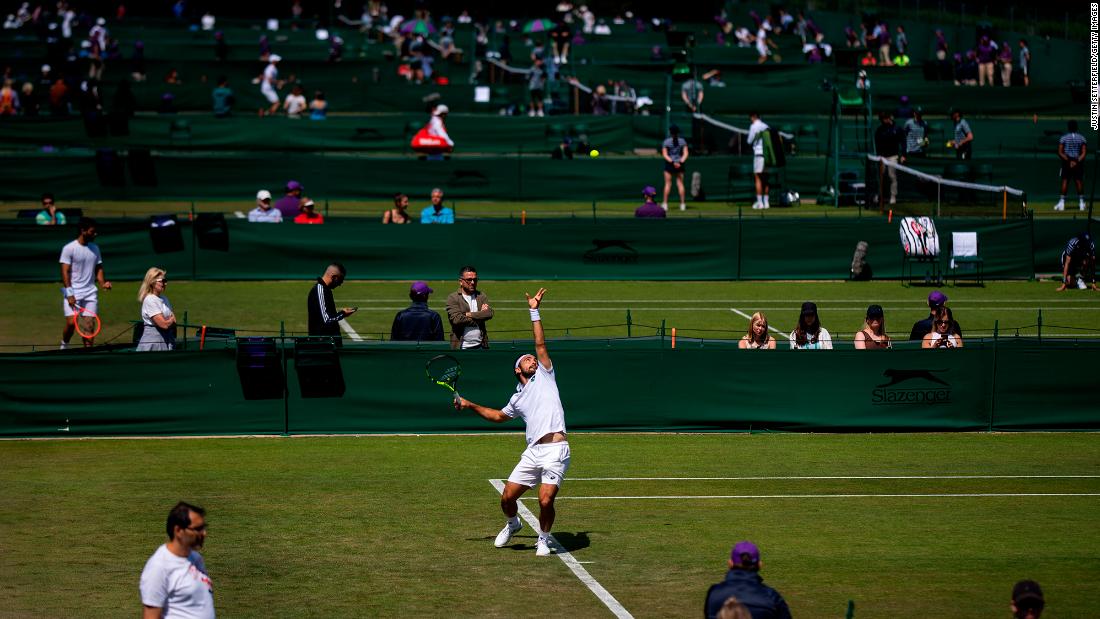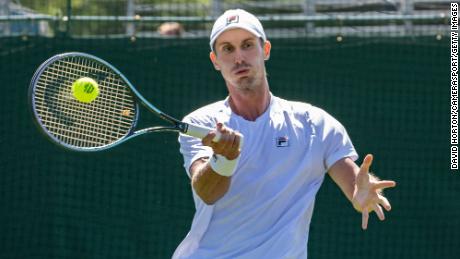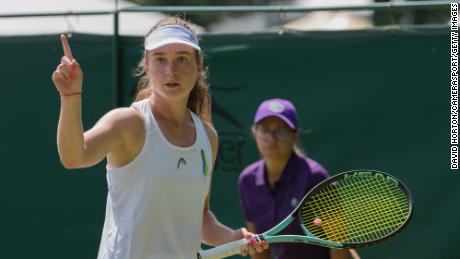
This is Wimbledon — the third grand slam tournament of the calendar year — but the venue and the competitors are not quite as most know it. At this tennis club, the crowds are smaller, the cheers quieter, and the courts packed closer together than at the All England Club three miles away.
While the Wimbledon main draw may not get underway until next week, for more than 250 players the journey to get there has already begun.
The four-day qualification tournament in the London district of Roehampton can be a golden ticket for the Wimbledon main stage — a place at which some players have dreamed of competing their whole careers.
“And actually, where we stay is right next to the gate at Wimbledon. Every day I’m so close — I can see it, but I haven’t actually been through the gates in 10 years, so that would obviously be amazing to be there once again.”
Prior to Monday, Krueger had never won a match at the Wimbledon qualifiers — affectionately known as “qualies.” But a 6-1 6-4 victory against Britain’s Luca Pow saw the 28-year-old take a small but significant step towards the main draw.
“I’ve played a lot of close matches in the first rounds, but I’ve never actually got over the hump,” Krueger continues. “The fact that I was able to close to out is really big. I’m pumped to keep my grass court season going.”
Qualifying perks
Most players qualify for grand slams via their ranking position, but up to eight spaces in each draw are reserved for wild cards — decided by the tournament organizers — and 16 for qualifiers, meaning those ranked well outside the top 100 have an unlikely shot at grand slam glory.
Even progressing through qualification is no mean feat. Players must either win all three of their matches, or hope they can pick up a spot as a “lucky loser” after a late withdrawal from the main draw.
“There’s always going to be some nerves, especially for a slam, but I think the good thing about coming through qualifying is you kind of get most of that behind you,” says Krueger, who first qualified for the main draw of a grand slam at the 2018 US Open.
“You’ll have three tough matches under your belt, whereas everyone else is coming in with nothing. If you can handle it physically, it’s definitely an advantage to be able to qualify.”
Success in qualifying can also be a substantial payday for those lower down rankings.
The men’s and women’s qualifying singles have a combined prize fund of £3,648,000 (around $4,465,000) — a 26% increase on 2021 — and just getting to the first round of the main draw is enough to earn a one-off payment of £50,000 (around $61,000).
‘Dream come true’
At this year’s Wimbledon qualifying, some courts have been kitted out with temporary stands, while at others, spectators are able to take up a viewing position meters from the action, creating an intimate atmosphere for the players.
Adjusting to the playing conditions can take time — particularly for those with limited experience on grass courts. Switzerland’s Alexander Ritschard, ranked No. 192 in the world, is competing in just his second grass-court tournament.
“It’s super different. I’m absolutely not used to it,” Ritschard tells CNN Sport after his 4-6 6-1 6-2 victory against Britain’s Stuart Parker. “But it’s definitely a fun surface with bounces I’ve never seen before. I feel like I don’t have as much ball control as I usually do on other courts.
“I’m also surprised that despite it being kind of fast, it’s also kind of slow,” he adds. “I can’t quite make it out yet — I’m working on it.”
Ritschard has never played in the main draw of a grand slam, but he came close at this year’s French Open when he lost in the third round of qualifying. To go one step further at Wimbledon, he says, would be “very special.”
“That would be a dream come true, for sure,” he says. “Growing up, you always talk about Wimbledon as a kid.
“I would also just love to play on the main site — that would be great. Those courts look gorgeous … The last time I was there I think I was eight years old, just as a fan to go and watch. I don’t quite remember what it looks like.”
Ranking points
Some players competing in qualifying have already graced Wimbledon’s main stage. Ukrainian Daria Snigur won the girls’ singles title on Centre Court three years ago and is now bidding to compete in her first senior grand slam.
“I love the grass court,” she tells CNN Sport after winning her opening qualifying match. “This is my favorite place … and grass is my favorite surface. Of course, I want to play on the main draw.”
Snigur is playing at Roehampton with the flag of Ukraine pinned to her tennis kit and thoughts of her homeland close to her heart.
Snigur is fully behind Wimbledon’s decision to exclude Russians and Belarusians, which she says is “very important” for her as a Ukrainian: “For me, it doesn’t matter — with points or without points,” she adds.
The removal of ranking points from this year’s Wimbledon hasn’t deterred players from competing in the tournament, which will include nine of the top 10 players in the women’s rankings and seven of the top 10 in the men’s. The four absentees are due to injury and the exclusion of Russian and Belarusian players.
The tournament does have the added incentive of extra prize money — the total purse is just over £40 million ($49 million), a 15.2% increase on last year — but the prestige of competing at Wimbledon is also an allure — as those playing at qualifying are fully aware.
For some, just stepping foot on the tournament’s manicured lawns is the realization of years-long dreams.
“Wimbledon being Wimbledon, it’s always going to be special regardless of whatever’s going on,” says Krueger. “Playing on the main set of Wimbledon is everyone’s goal — it doesn’t matter if there are points or not.”

